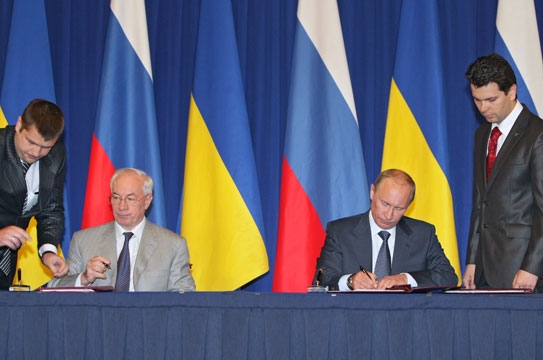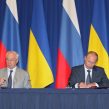
Gas Talks In Moscow Raise Pressures On Ukraine
Publication: Eurasia Daily Monitor Volume: 8 Issue: 112
By:

On June 7 in Moscow, Prime Ministers Vladimir Putin and Nikolai Azarov held tense negotiations on the terms of Russian gas supplies to Ukraine. The government in Kyiv and its Donetsk-based industrial interests are seeking a second round of gas price-cutting, after that agreed in April 2010. The concluding press conference showed Azarov almost beseeching Russia for yet another price cut, and Putin refusing it. However, Putin hinted publicly that Ukraine could obtain price relief by joining the Russia-Belarus-Kazakhstan Customs Union; and he reiterated behind closed doors that “merging” Naftohaz Ukrainy with Gazprom would also result in a lower price for Russian gas to Ukraine (Interfax, UNIAN, June 7, 8; Kommersant, June 8).
Azarov’s arguments sounded naïve and likely to earn Russian disrespect for his government. Stating that the terms of Russian gas supplies were “unjust” and “incomprehensible to Ukraine,” he asked Russia (and “Vladimir Vladimirovich” [Putin] in particular) to “show understanding for our problems.” Azarov claimed (inaccurately, as he has done in previous negotiating rounds) that European countries as a rule pay lower price than Ukraine does for Russian gas. On the whole, Azarov’s tone is that of a disappointed but still obsequious Russophile. This sets the wrong atmosphere for Ukraine’s further negotiations with Russia, if Azarov remains in charge of these negotiations.
The Ukrainian team (with Energy Minister Yurii Boyko taking a back seat to Azarov) proposed a range of price-reduction solutions, including: 1. changing the pricing formula by decoupling the gas price from that of the oil-products basket [the gas-to-oil price peg artificially raises the price of Russian gas to many European countries]; 2. raising the transit-service fee for Russian gas en route to Europe through Ukrainian pipelines, and subtracting that fee from the price of Russian gas delivered to Ukraine; 3. allowing Central Asian gas [presumably Turkmen] to reach Ukraine via Russia, in volumes of 20 to 25 billion cubic meters (bcm) per year. Azarov had already submitted some of these proposals in a letter to Putin ahead of the Moscow talks.
Putin dismissed these arguments. He rejected the claim that Russian gas is priced higher for Ukraine than for many European countries. He ruled out a linkage between transit-service fees for Russian gas exports via Ukraine and the price of gas supplied to Ukraine. And he announced (unverifiable) that Ukraine had saved $2.9 billion from its gas bill in 2010, and $2.1 billion in January-April 2011, thanks to the price cut agreed with Russia in 2010.
The transit-service fee is regulated by the bilateral agreement of January 2009. It set the fee at $2.04 per one thousand cubic meters of Russian gas moving through one hundred kilometers of Ukrainian pipelines for the year 2010. The same agreement stipulates a floating rate from 2011 onward. It was last reported rising to $2.84 per one thousand cubic meters through one hundred kilometers in the first quarter of 2011. Thus, Moscow claims that Ukraine is being compensated adequately.
However, Putin hinted at possible “options” for a mutually acceptable solution i.e., Ukraine joining the Russia-led Customs Union, or ceding control of Naftohaz, in return for a second cut in the price of Russian gas. Using an argument that the German government will find particularly interesting, Putin cited Gazprom’s jointly owned pipelines with German companies on German territory as an example for Ukraine to follow. “Moscow and Berlin have integrated with each other more than Russia with Ukraine,” Putin added (UNIAN, June 7).
Gazprom CEO, Aleksei Miller, had ruled out a price cut for Ukraine on the eve of Azarov’s visit (Interfax, June 6). However, Gazprom is known to seek some form of shared control over Ukraine’s gas transit system, which is 100 percent Ukrainian state-owned through Naftohaz, in return for a second cut in the price of Russian gas.
Under the Kharkiv agreements in April 2010, Russia granted Ukraine a 30 percent discount on the price of gas, relative to the January 2009 agreement concluded by Yulia Tymoshenko’s government with Putin and Gazprom. In return, Ukrainian President Viktor Yanukovych agreed with Russian President Dmitry Medvedev to prolong the stationing of Russia’s Black Sea Fleet on Ukraine’s territory until well into the 2040s.
Meanwhile, the price per one thousand cubic meters of Russian gas is rebounding to levels that threaten the survival of Ukraine’s inefficient chemical and steel industries. After a fleeting drop from $306 in the first quarter of 2010 to $233 in the second quarter (an immediate result of the Kharkiv agreements), the price rose to $249 in the third quarter, $252 in the fourth, $264 in the first quarter of 2011, and $295 in this year’s second quarter. Ukraine’s energy ministry forecasts a further rise, to $350 in the third quarter and $400 in the fourth quarter of 2011. To raise the pressure on Kyiv, Gazprom is publicly forecasting $500 per one thousand cubic meters of Russian gas for the end of 2011 (Interfax, May 26, June 3).
The main factor behind the upward curve is the peg of the Russian gas price to the surging world price of oil. At the concluding press conference, Putin blamed the surging oil-price largely on Western sanctions and military interventions in Iraq and Libya, as well as speculation in oil futures on Western commodity exchanges. “You have to pay,” he told Ukraine (Interfax, The Moscow Times, June 7, 8).
Yanukovych has now set the goal of cutting the price to $240 per one thousand cubic meters of Russian gas. While ruling out a “merger” of Naftohaz Ukrainy with Gazprom, Yanukovych considers the possibility of selling portions of Ukraine’s gas transit system to Gazprom through “market-based, transparent privatization” (Interfax-Ukraine, May 24). Azarov’s government is studying another option – namely, some form of accession to the Moscow-led Customs Union, in return for a gas price cut. The government has set up a commission to study possible accession to some of the Customs Union’s agreements (UNIAN, Channel Five TV [Kyiv], June 9).




